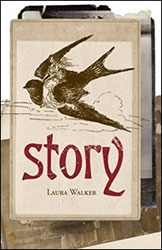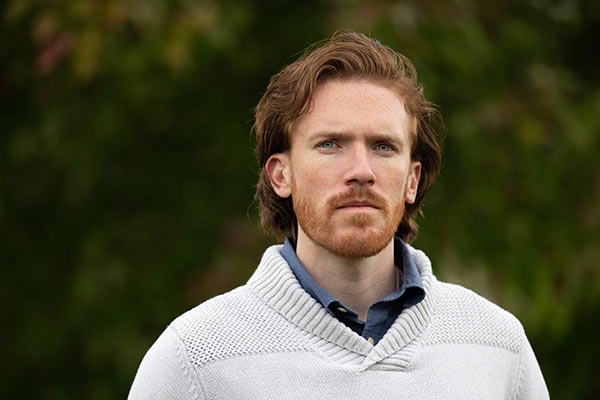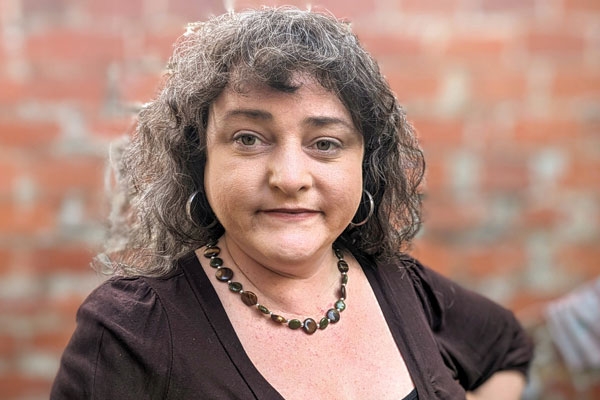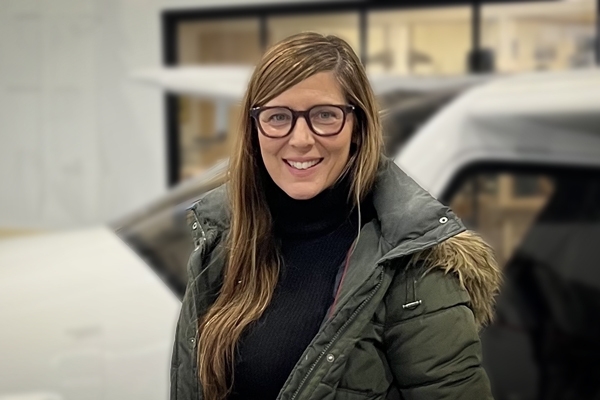Poets Studied and in Conversation instructor Laura Walker recently published story, a collection of poems about how we form the stories we tell ourselves. We asked Walker about the influences and inspirations for her work.
In a 2015 interview with Thermos, you said story is "a series of prose blocks circling around ideas of story and its manifestations, weaving characters, fairy tales, family stories and memories, both ‘real’ and created." You go on to say, "Sometimes I say it's as close to writing a novel as I'll ever get, which is not very close. But there was something that felt ‘novelistic’ for me as I wrote it; for example, the ways in which I needed to erect a structure and simultaneously keep it aloft while turning my attention elsewhere—like putting up a circus tent and drawing something obscure and difficult on the floor at the same time. Destined for failure but exhilarating, too." What made you want to write outside of your comfort zone?

In my Extension classes, we talk a lot about stretching ourselves, getting outside what's familiar and comfortable, and how exhilarating that is—the generative power of losing your bearings, as Rebecca Solnit describes in A Field Guide to Getting Lost. I think I have to be a little bit lost to stay curious, to stay engaged; repeating the familiar is just not as interesting. And I really believe in the beauty of failure, of the inadequate attempt, which language always is and for me is part of what makes it compelling territory.
What else can you tell me about "story"? Does it have a backstory?
The book began with a hazy childhood memory of lying on a bed beside a grown man I didn't know well, listening to him tell fairy tales, and feeling disembodied, ill-at-ease, alone. I started thinking about what that memory might signify; what stories we tell ourselves about our own past and our own bodies; what story does and doesn't offer us in terms of agency, creation, change and possibility; how inherited and family stories morph and shift over time, and why; and what story itself might need, want, experience.
When was the book released? Will you be holding a book signing or a reading?
The book was released May 15, 2016, and I'm so grateful to Apogee Press. I'll be doing my first reading from story at University Press Books in Berkeley on June 16, 2016, with the wonderful poet Sarah Heady, and I hope to do readings later in the fall, both in the East Bay and in San Francisco.
Your spring course, Poets Studied and in Conversation, showcases the work of local poets. How has teaching this course—and others like it for the Post-Baccalaureate Certificate Program in Writing—influenced your own writing?
I feel very lucky to teach Poets Studied and in Conversation. Over the course of a semester, we study the work of five local poets; read their latest books, interviews and essays; and write poetry inspired by what we read. Then the poets join us for an intimate conversation about their work. It would be hard not to be inspired. I get to read very closely, create long lists of poetic experiments inspired by what I read, discuss poems with insightful students, read students’ own experiments in response to the books, and hear from the authors about some of the things they were grappling with as they wrote. To date, we’ve hosted 50 poets. For me, it’s the ideal teaching experience.
When those poets come to class, your students will be able to study and emulate their work. Who do you consider to be your greatest mentor in your own search for “who you are” in writing?
I've been lucky to have many mentors in my writing life, both on the page and in person. I don't feel that I’m looking for “who I am” in my poetry as much as I'm discovering and pursuing different questions, different areas of poetic investigation, which shift over time. Kathleen Fraser is a writer who models that spirit of writerly inquiry beautifully. Each of her books is a foray into new poetic territory, and she constantly pushes against the familiar and into new terrain, finding ways to disrupt her own poetic habits.
What piece of advice would you give to a student who is uncertain about pursuing a career as a poet?
I believe in uncertainty. And the word “career” for me has certain connotations, like a salary, which don't really apply to poetry: You'll always need to be doing something else as well, unless you don't need an income. But if students are interested in writing poetry, I'd encourage them to pursue that interest and not be deterred by the low value our culture and economy place on poetry. In general, people who write poetry really, really want to be doing what they’re doing. They're making time for it in their busy and complex lives; they're funding presses and journals out of their own pockets; they're creating communities and attending readings; and they're working very hard to hold space open for poetry. And for these reasons, poetry communities are vibrant and inspiring. And I wish poets were well-paid, too.
When those poets come to class, your students will be able to study and emulate their work. Who do you consider to be your greatest mentor in your own search for “who you are” in writing?
I've been lucky to have many mentors in my writing life, both on the page and in person. I don't feel that I’m looking for “who I am” in my poetry as much as I'm discovering and pursuing different questions, different areas of poetic investigation, which shift over time. Kathleen Fraser is a writer who models that spirit of writerly inquiry beautifully. Each of her books is a foray into new poetic territory, and she constantly pushes against the familiar and into new terrain, finding ways to disrupt her own poetic habits.
What piece of advice would you give to a student who is uncertain about pursuing a career as a poet?
I believe in uncertainty. And the word “career” for me has certain connotations, like a salary, which don't really apply to poetry: You'll always need to be doing something else as well, unless you don't need an income. But if students are interested in writing poetry, I'd encourage them to pursue that interest and not be deterred by the low value our culture and economy place on poetry. In general, people who write poetry really, really want to be doing what they’re doing. They're making time for it in their busy and complex lives; they're funding presses and journals out of their own pockets; they're creating communities and attending readings; and they're working very hard to hold space open for poetry. And for these reasons, poetry communities are vibrant and inspiring. And I wish poets were well-paid, too.


